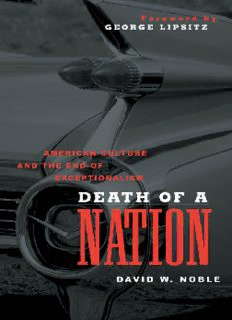
Death of a Nation: American Culture and the End of Exceptionalism (Critical American Studies) PDF
Preview Death of a Nation: American Culture and the End of Exceptionalism (Critical American Studies)
Death of a Nation Critical American Studies Series George Lipsitz,University ofCalifornia–San Diego,Series Editor Death ofa Nation: American Culture and the End ofExceptionalism David W.Noble The Culture Concept: Writing and Difference in the Age ofRealism Michael A.Elliott Not the Triumph but the Struggle: The1968Olympics and the Making ofthe Black Athlete Amy Bass The New American Studies John Carlos Rowe Those without a Country: The Political Culture ofItalian American Syndicalists Michael Miller Topp American Studies in a Moment ofDanger George Lipsitz Death of a Nation American Culture and the End of Exceptionalism David W.Noble Foreword by George Lipsitz Critical American Studies University ofMinnesota Press Minneapolis London Copyright 2002 by the Regents ofthe University ofMinnesota All rights reserved.No part ofthis publication may be reproduced,stored in a retrieval system,or transmitted,in any form or by any means,electronic, mechanical,photocopying,recording,or otherwise,without the prior written permission ofthe publisher. Published by the University ofMinnesota Press 111 Third Avenue South,Suite 290 Minneapolis,MN 55401-2520 http://www.upress.umn.edu Library ofCongress Cataloging-in-Publication Data Noble,David W. Death ofa nation :American culture and the end ofexceptionalism / David W.Noble. p. cm.— (Critical American studies series) Includes bibliographical references and index. ISBN0-8166-4080-7 (acid-free paper) — ISBN 0-8166-4081-5 (pbk.: acid-free paper) 1. Criticism—United States—History—20th century. 2. Nationalism and literature—United States—History—20th century. 3. Literature and history—United States—History—20th century. 4. American literature—History and criticism—Theory,etc. 5. United States—Civilization—20th century. 6. United States—Historiography. I. Title. II. Series. PS78 .N63 2002 801'.95'09730904—dc21 2002009538 Printed in the United States ofAmerica on acid-free paper The University ofMinnesota is an equal-opportunity educator and employer. 12 11 10 09 08 07 06 05 04 03 02 10 9 8 7 6 5 4 3 2 1 To the memories ofmy grandmothers,Lucinda and Willahmina, and my mothers,Estelle and Agnes To my wife Gail and our two youngest grandchildren,Ella and Zach This page intentionally left blank Contents Foreword:The Unpredictable Creativity ofDavid Noble ix George Lipsitz Acknowledgments xix Introduction:Space Travels xxiii ONE The Birth and Death ofAmerican History 1 TWO Historians Leaving Home,Killing Fathers 38 THREE The Crisis ofAmerican Literary Criticism from World War I to World War II 79 FOUR Elegies for the National Landscape 106 FIVE The New Literary Criticism:The Death ofthe Nation Born in New England 129 SIX The Vanishing National Landscape:Painting,Architecture,Music, and Philosophy in the Early Twentieth Century 151 SEVEN The Disintegration ofNational Boundaries:Literary Criticism in the Late Twentieth Century 215 EIGHT The End ofAmerican History 250 Epilogue 287 Notes 303 Index 337 F O R E W O R D The Unpredictable Creativity of David Noble George Lipsitz The temporal distance separating us from the past is not a dead interval but a transmission that is generative ofmeaning. —Paul Ricoeur,Time and Narrative David Noble is an original and generative thinker.For more than five decades,his writings have offered us unparalleled insights into the U.S. nation and its collective imagination.Like most historians,he concerns himself with change over time,with what can be learned once we real- ize that part of “what things are” lies in “how they came to be.” But Noble is not just interested in whatwe know,he also wants us to think abouthowwe know.His analyses probe beneath surface appearances to reveal unexamined assumptions and uninterrogated ideologies embed- ded in the seemingly neutral terms and concepts that we use when we think about national history,national culture,and national belonging. Noble shows how the dominant intellectual traditions of the United States have produced distinctly nationalist ways ofknowing and think- ing that have most often served the selfish interests ofelites.He asks us to examine the forms of cognitive mapping that lead us to think of our- selves primarily as national citizens and national subjects,to understand the origins and implications of the enduring belief that our nation re- mains uniquely innocent and pure in a corrupt and degraded world, and to contemplate the contradictions that emerge when a bounded nation believes itself entitled to boundless markets.Although Noble’s many and varied writings over the years have encompassed a dazzling ix
Description: